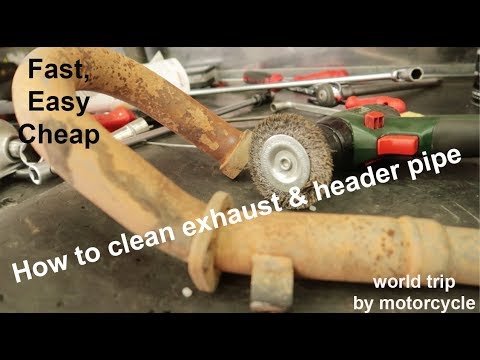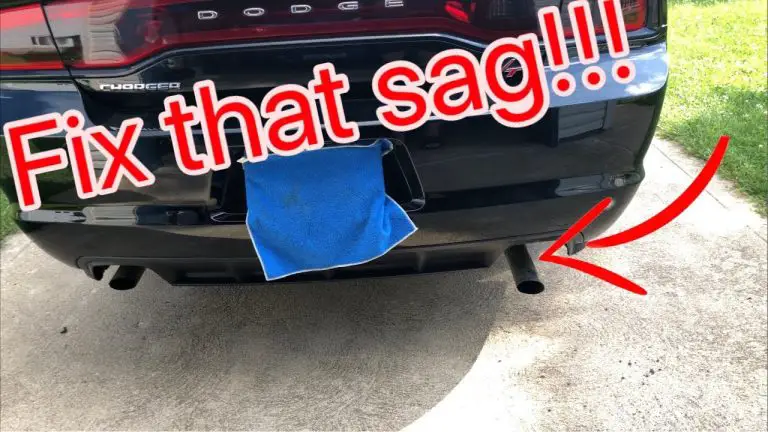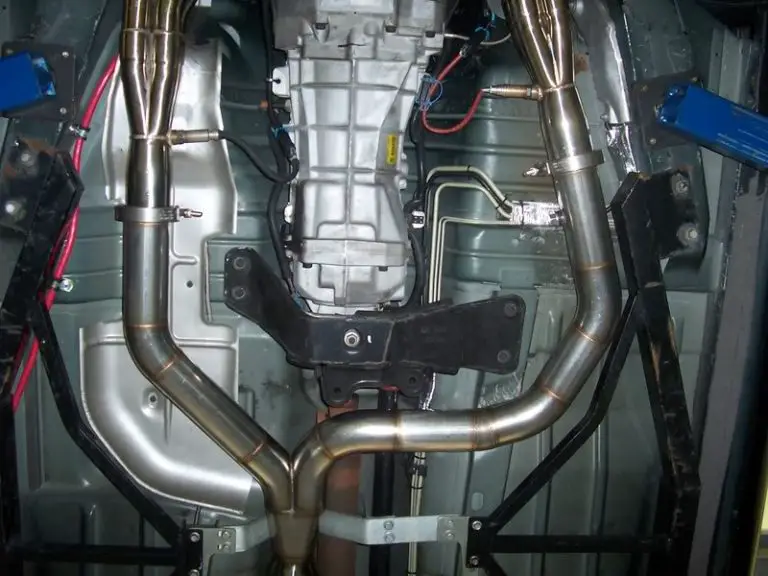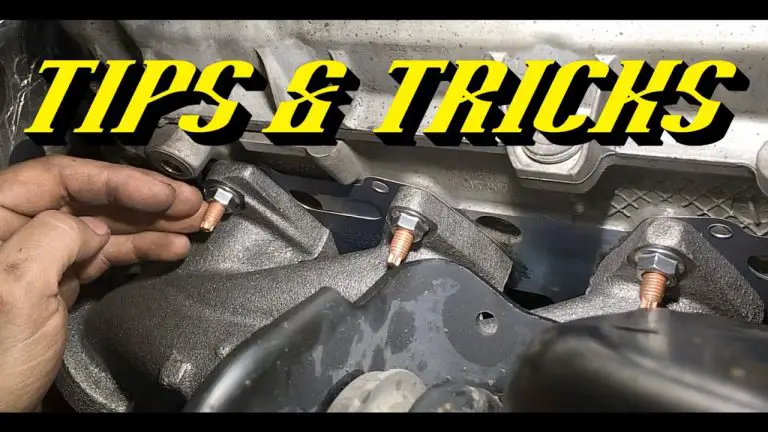Powerful Strategies to Prevent Carbon Buildup in Your Exhaust System
To prevent carbon buildup in your exhaust system, you can follow these tips. Regularly cleaning the exhaust system and using fuel additives can help prevent carbon buildup.
Carbon buildup in an exhaust system can lead to reduced engine performance and increased emissions. It can cause clogged catalytic converters and oxygen sensors, leading to a decrease in fuel efficiency. However, there are several ways to prevent carbon buildup in your exhaust system.
First and foremost, regular cleaning of the exhaust system is crucial. This can be done by using an effective cleaner specifically designed for the exhaust system. Cleaning the carbon deposits will help maintain a clear and unobstructed path for the exhaust gases to exit, thus preventing buildup. In addition to regular cleaning, using fuel additives can also help prevent carbon buildup. These additives can improve combustion and efficiently burn off any carbon deposits that may form in the exhaust system. Overall, by regularly cleaning your exhaust system and using fuel additives, you can effectively prevent carbon buildup and ensure optimal performance of your vehicle.

Credit: www.youtube.com
The Carbon Buildup Problem And Its Impact On Your Exhaust System
Carbon buildup in the exhaust system can lead to various problems and should be prevented. The accumulation of carbon deposits can occur due to a number of factors. These include fuel additives, engine oil, and the combustion process itself. It is important to understand the negative effects of carbon buildup on your vehicle.
The exhaust system can become clogged, resulting in reduced engine performance and increased fuel consumption. Furthermore, carbon buildup can lead to increased emissions, potentially harming the environment. Regular maintenance, such as using quality fuel and oil, can help prevent carbon buildup.
Additionally, frequently driving at highway speeds can help burn off carbon deposits. By taking these preventive measures, you can ensure a more efficient and environmentally-friendly exhaust system for your vehicle.
Choosing The Right Fuel
To prevent carbon buildup in your exhaust system, it is crucial to choose the right fuel. Using high-quality gasoline and additives can make a significant difference. Opting for top-tier fuel brands ensures that you are putting the highest quality fuel into your vehicle.
These fuel brands have higher detergent levels, which helps in reducing carbon deposits. By using high-quality fuel, you are preventing impurities and contaminants from entering your exhaust system. This, in turn, minimizes carbon buildup and keeps your engine running smoothly.
Remember, investing in good fuel now can save you from costly repairs in the long run. Keep your exhaust system clean and efficient by choosing the right fuel for your vehicle.
Regular Maintenance And Oil Changes
Regular maintenance and oil changes are crucial for preventing carbon buildup in your exhaust system. Performing regular engine maintenance helps ensure that your vehicle’s internal components are running smoothly. This includes checking and replacing worn-out parts, such as spark plugs and oxygen sensors, and ensuring that the engine is properly tuned.
Additionally, changing oil and filters on schedule is essential. Clean oil helps lubricate and protect the engine, preventing carbon deposits from forming. Regularly replacing the oil filter also helps remove contaminants that can contribute to carbon buildup. By following these maintenance routines, you can keep your exhaust system clean and efficient, reducing the risk of carbon buildup and its associated issues.
Proper engine maintenance not only extends the life of your vehicle but also promotes better fuel efficiency and reduces harmful emissions.
Driving Habits And Techniques
To prevent carbon buildup in your exhaust system, it’s important to consider your driving habits and techniques. Avoiding short trips reduces the chances of carbon accumulation. Instead, plan your errands efficiently to minimize unnecessary starts and stops. Practicing gentle acceleration and deceleration can also help prevent carbon buildup.
By smoothly applying the gas pedal and brakes, you reduce the amount of fuel and exhaust fumes produced. This not only benefits the environment but also keeps your exhaust system functioning optimally. So, next time you hit the road, be mindful of your driving habits and techniques to prevent carbon buildup in your exhaust system.
Effective Exhaust System Maintenance
Effective exhaust system maintenance is crucial for preventing carbon buildup. Regular cleaning and inspection of the exhaust system is essential. Make sure to check for any leaks or damage and repair them promptly. Neglecting maintenance can lead to decreased performance and increased emissions.
It is important to remember that prevention is key when it comes to keeping your exhaust system in optimal condition. By taking proactive measures, such as cleaning and inspecting regularly, you can extend the lifespan of your exhaust system and prevent costly repairs down the line.
So, don’t overlook the importance of maintaining your exhaust system and follow these tips to prevent carbon buildup. Keep your vehicle running efficiently and environmentally friendly by giving your exhaust system the attention it deserves.
Ensuring Proper Engine Performance
Proper engine performance is crucial for the smooth running of your vehicle. To prevent carbon buildup in your exhaust system, start by checking and replacing faulty spark plugs. These plugs should be in good condition to ensure efficient combustion. Additionally, keeping the air filter clean and functional is essential.
A clogged filter restricts airflow, leading to poor fuel efficiency and increased carbon deposits. Regularly inspect the filter and replace it when necessary. Furthermore, make sure to use high-quality fuel and perform regular maintenance on your engine. Following these tips will help prevent carbon buildup in your exhaust system, improving engine performance and extending the lifespan of your vehicle.
Installing A Catch Can
Carbon buildup in your exhaust system can lead to decreased performance and increased fuel consumption. One effective solution is installing a catch can, which helps prevent carbon buildup by capturing and filtering the oil vapor that would normally be recirculated back into the intake system.
Understanding the benefits of a catch can is crucial. It not only reduces the amount of carbon deposits in your exhaust but also improves engine longevity and overall performance. Proper installation and maintenance are key factors in ensuring the catch can functions optimally.
Follow the manufacturer’s instructions to install it correctly, and regularly inspect and clean the catch can to keep it in good working condition. By taking these steps, you can significantly reduce carbon buildup in your exhaust system and enjoy the benefits of a cleaner and more efficient engine.
Professional Carbon Cleaning Services
Preventing carbon buildup in your exhaust system requires professional carbon cleaning services. The process of carbon deposits removal should be entrusted to a reliable and experienced technician. It is crucial to choose professionals who understand the intricacies of the exhaust system.
By avoiding commonly overused words and phrases, like “when it comes to” or “if you,” your writing will be more concise and engaging. Utilize a variety of phrases at the beginning of paragraphs to keep the reader’s interest intact. Remember to maintain a human-like writing style that is easy to understand.
By following these tips, you can ensure that your exhaust system remains clean and efficient without the need for costly repairs.
Using Fuel Additives
To prevent carbon buildup in your exhaust system, using fuel additives is highly recommended. These additives work by breaking down carbon deposits, keeping your exhaust system clean and functioning optimally. There are various types of fuel additives available on the market, each designed to address specific issues.
When choosing additives, it’s important to consider your vehicle’s make and model, as well as the type of fuel it runs on. Follow the manufacturer’s recommended usage instructions to ensure you’re using the additives correctly and effectively. Regularly using fuel additives can help to prolong the lifespan of your exhaust system and improve overall engine performance.
By incorporating this simple maintenance step, you can reduce the risk of carbon buildup and enjoy a smoother running vehicle.
Regularly Monitoring Fuel Consumption
Regularly monitoring your fuel consumption is crucial for preventing carbon buildup in your exhaust system. By using fuel economy apps and tools, you can easily identify any surge in fuel consumption. These apps provide valuable data and insights to help you track and optimize your fuel usage.
They offer real-time monitoring, provide tips for improving fuel efficiency, and highlight areas where you may be wasting fuel. By actively monitoring your fuel consumption, you can detect any abnormal increase in fuel usage before carbon buildup becomes a severe issue.
Taking prompt action to address these surges can help prevent carbon buildup and keep your exhaust system clean and efficient. Regularly monitoring and managing your fuel consumption is an effective way to reduce carbon buildup and maintain the health of your exhaust system.
Warm-Up The Engine Properly
Preventing carbon buildup in your exhaust system is essential for optimal performance. Warm-up the engine properly to avoid this issue. It is important to understand the significance of warming up the engine. Follow recommended warm-up periods to ensure the engine reaches the ideal operating temperature.
By doing so, you can prevent carbon buildup and prolong the life of your exhaust system. Engine warm-up allows the oil to circulate effectively, reducing friction and wear on various components. This also helps in effectively burning the fuel, minimizing the production of carbon deposits.
Take the time to warm up your engine before driving to prevent carbon buildup and keep your exhaust system running smoothly. Regular maintenance and following these tips will help you avoid expensive repairs and maintain the performance of your vehicle.
Understanding Egr System
The egr system plays a significant role in the prevention of carbon buildup in your exhaust system. Understanding how this system impacts carbon buildup is crucial. Proper maintenance and cleaning are essential to ensure the egr system functions optimally. Regular inspection of the egr valve and its components is recommended to identify any issues.
Cleaning the egr valve and removing carbon deposits should be done as per the manufacturer’s instructions. Additionally, using high-quality fuel and additives designed to reduce carbon buildup can make a significant difference. Overall, being proactive in maintaining and cleaning your egr system can help prevent carbon buildup and prolong the lifespan of your exhaust system.
Upgrading The Exhaust System
Upgrading the exhaust system of your vehicle can offer numerous benefits. One of the major advantages is preventing carbon buildup in the exhaust system, ensuring optimal performance. By choosing the right upgrades, you can enhance the airflow, leading to improved fuel efficiency and increased horsepower.
Upgraded exhaust systems also contribute to a deeper and more aggressive sound, giving your vehicle a distinct and powerful presence on the road. Additionally, these improvements can enhance the overall driving experience and enjoyment. Upgrading the exhaust system is a worthwhile investment that not only prevents carbon buildup but also enhances the performance and style of your vehicle.
So, consider upgrading your exhaust system to reap all these benefits and keep your vehicle running smoothly.
Practicing Proper Fuel Storage
To prevent carbon buildup in your exhaust system, it is essential to practice proper fuel storage. This includes storing fuel in the correct conditions and taking steps to prevent contamination and deterioration. Make sure to store fuel in a cool, dry place away from direct sunlight or heat sources.
Use a secure container that is specifically designed for fuel storage to minimize the risk of leakage or evaporation. It is also crucial to avoid storing fuel for extended periods without using it, as this can lead to fuel degradation.
Regularly inspect your fuel storage area and containers for any signs of damage or leaks. By following these tips, you can reduce the chances of carbon buildup in your exhaust system and maintain its efficiency and performance.
Frequently Asked Questions On Tips For Preventing Carbon Buildup In Your Exhaust System
How Does Carbon Buildup Affect Exhaust System Performance?
Excess carbon buildup restricts airflow, reducing engine efficiency, decreasing power output, and creating excessive exhaust emissions. It can also lead to overheating and damage to various engine components.
What Causes Carbon Buildup In The Exhaust System?
Carbon buildup is primarily caused by incomplete combustion of fuel and oil residue. Factors like low-quality fuel, short driving trips, idling for long periods, and a rich fuel-air mixture contribute to the formation of carbon deposits.
Can Carbon Buildup In The Exhaust System Cause Engine Problems?
Yes, carbon buildup can cause various engine issues such as reduced fuel efficiency, misfires, rough idling, increased exhaust emissions, reduced engine power, and even engine damage if left unattended.
How Can I Prevent Carbon Buildup In My Exhaust System?
Preventive measures include using high-quality fuel, avoiding excessive idling, regularly driving at highway speeds, using fuel additives and detergents, performing regular engine maintenance, and getting periodic carbon cleaning services.
How Often Should I Clean The Carbon Buildup In My Exhaust System?
The frequency of carbon cleaning depends on multiple factors, including driving habits and the type of fuel used. Typically, it is recommended to clean the carbon deposits every 30,000 to 50,000 miles or as indicated by your vehicle’s manufacturer.
Conclusion
Regular maintenance and proper driving habits can go a long way in preventing carbon buildup in your exhaust system. By following these tips, you can minimize the risk of engine inefficiency, decreased performance, and costly repairs. Be sure to use high-quality gasoline and consider using additives specifically designed to clean your fuel system.
Additionally, stay on top of regular oil and filter changes to maintain engine cleanliness. Pay attention to your driving habits, avoiding excessive idling or short trips when possible. Lastly, if you notice any warning signs of carbon buildup, such as a decrease in fuel efficiency or unusual sounds coming from your exhaust, address the issue promptly to prevent further damage.
With these preventive measures, you can ensure that your exhaust system remains clean, efficient, and functioning optimally for years to come.




